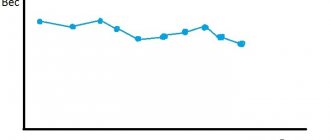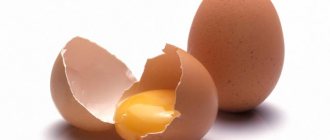Body mass index
You can find out if you are overweight easily and simply at home. To do this, it is enough to determine your body mass index (BMI). This indicator is calculated using a simple formula: your weight in kilograms must be divided by your height in meters squared. It is believed that overweight is when the BMI is above 25, obese - above 30. Why know your BMI? Firstly, this will help avoid incorrect assessment of your own weight. Often (especially for young women), people tend to exaggerate the situation related to their weight, “diagnosing” themselves as almost obese despite completely normal indicators. Secondly, by comparing your body mass index with the average statistical values, you can determine your tendency to be overweight (for example, if your BMI already reaches 25) and begin preventing obesity. In such cases, in order not to harm yourself, you must consult a specialist.
BMI, like weight in principle, is a variable value, which is indirectly affected by calories.
BMI, like weight in principle, is a variable value that is indirectly affected by calories: weight loss begins when you burn more calories than you consume. This can be done by reducing the energy content of food and drinks and increasing the amount and frequency of physical activity. And this is where the most common mistakes happen. For example, people get hooked on the most unimaginable diets that promise almost instant results, while being highly physically active. Or they use the lowest calorie mono-diets, and their activity level still remains low. In both cases, the body is depleted. The weight really drops a lot, but after finishing such diets it instantly returns.
Reasons for regaining weight after dieting
The main reasons for weight gain after finishing a diet include:
Losing weight too quickly.
Of course, it is incredibly pleasant when you manage to quickly lose extra pounds, but for the body such metamorphoses are a great stress and a signal to return to its original positions.
There is a theory that the body tends to get used to the weight at which it remains for a long time. This weight for the brain is a kind of balance point. When balance is disturbed, the body rushes to restore it.
In addition, when stressed, a large amount of the hormone cortisol is released into the blood, which slows down metabolism. With a slow metabolism, you will begin to gain weight again, even if you don’t overeat.
Too strict diet.
For the normal functioning of the body, it is necessary to provide it with a certain amount of energy every day. If you have cut down on your daily caloric intake too much to lose weight, subsequently even a small increase in the calorie content of your meals will lead to rapid weight gain - after the diet you will weigh much more than before.
Don't forget about the negative effects of cortisol: maintaining weight after losing weight with a slow metabolism will be almost impossible.
Return to normal diet.
Returning to the same eating habits that caused you to gain weight in the first place is completely absurd, but many people stubbornly refuse to understand this. Most people who are losing weight literally count the days until the end of the diet in order to be able to overeat again on their favorite sweets and baked goods. It is not surprising that they fail to maintain weight after losing weight.
What diet is right for you?
The key to successful weight loss is adequate diet and exercise. You need to understand that a diet is not a one-time event, it is a way of life, a certain regimen that suits you and helps you maintain normal weight. Accordingly, the concept of “diet” should become synonymous with proper and healthy nutrition.
The concept of “diet” should become synonymous not only with proper and healthy nutrition, but also with a lifestyle (diet in Greek means way of life).
You need to choose your diet thoughtfully, taking into account the physiological needs of the body and your ability to maintain this diet for a long time. The following questions will help you with this:
- Does the proposed diet include a variety of foods: fruits, vegetables, grains, low-fat dairy products, lean sources of protein and nuts?
- Does your diet contain foods that you like, enjoy eating, and are willing to do so throughout your life?
- Can you easily find the products you need at your local grocery store?
- Will you be able to eat all foods during the diet (even if some of them are in limited quantities)?
- Does your diet fit your lifestyle and budget?
- Does your diet contain enough nutrients and calories to help you lose weight safely and effectively and maintain your weight?
- Is regular physical activity part of the plan?
If the answer to any of these questions is “no”, then this type of nutrition is not suitable for you, you need to look for something else.
How can a man gain weight quickly?
Having received the desired weight result, men want to increase muscle mass. This can only be done by revising your diet and increasing strength training. The diet should become higher in calories, but you still need to choose healthy foods. It could be:
- turkey;
- eggs;
- chicken;
- baked potato;
- cottage cheese and milk;
- fruits, vegetables and more.
You shouldn't gain weight with pizza, burgers and other fast food. The body after such a menu will be flabby and ugly. And there is a high risk that you will need to lose weight. Give preference to unprocessed foods. A piece of boiled chicken is better than semi-finished meat in broth.
As for training, it is worth increasing strength loads and creating an individual program to work all muscle groups. Complement your exercise routine with homemade protein shakes.
What do you need to remember?
As you can understand from the questions above, the diet should include fresh fruits and vegetables. They are rich in fiber, vitamins and other beneficial microelements, which reduces the risk of developing non-communicable diseases. It is advisable to eat seasonal vegetables that grow in the region where you live. When choosing a diet, it is important to reduce the amount of fat. But do not forget that there are different types of fats, and this is also a vital element in the body. They are involved in the construction of cell membranes and hormonal balance. Therefore, it is necessary to reduce trans fats and saturated fats, which are contained in salad dressings, sauces (mayonnaise, ketchup also fall into this category), low-fat yogurts, milk, cottage cheese, confectionery products prepared with margarine, candy, fast food, quick breakfasts and etc. It is advisable to replace fried food with boiled or steamed food. Use only vegetable oils and avoid animal fats (butter, margarine, spread, lard for frying).
It is better to replace the cake or candy with an apple or even a banana.
The main enemy of BMI is sugar. You need to understand that it is contained in both fruits and confectionery products. And if in the first case it is healthy sugar, then in the second it is a direct path to excess weight. Accordingly, it is better to replace the cake or candy with an apple or even a banana.
Homeostatic regulation
The main brain region responsible for controlling the homeostasis of food intake is the arcuate nucleus of the hypothalamus (ARC). Within the ARC, there are different, interacting groups of neurons, with opposing effects on energy balance. Neuropeptide Y (NPY) and agouti-related peptide (AgRP)-secreting neurons stimulate food intake, whereas pro-opiomelanocortin (POMC)-secreting neurons have the opposite effect. ARC projections extend to other regions of the hypothalamus, including the paraventricular nuclei (PVN), where thyrotropin-releasing hormone (TRH), corticotropin-releasing hormone (CRH) and oxytocin (suppress hunger) are secreted, as well as the lateral hypothalamus, which is the source of melanin-concentrating hormone (MCH) and orexins (cause hunger).
Table 1
Hormones and peptides involved in appetite regulation
| Localization | Anorexigenic | Orexigenic |
| Central | ||
| Hypothalamus | POMC (13) Nesfatin-1 (15) TRH (17) CHR (19) Oxytocin (21) Serotonin (23) Histamine (25) Urocortin (26) | NPY (14) AgRP (16) Orexins/hypocretins (18) MCH (20) Endocannabinoids (22) Opioids (24) |
| Peripheral | ||
| Gastrointestinal tract | CCK (27) GLP-1 (29) PYY (30) Oxyntomodulin (31) Enterostatin (32) Bombesin (33) Uroguanylin (34) | Ghrelin (28) |
| Pancreas | Amylin (35) Insulin (36) PP (37) | |
| Fat cells | Leptin (38) | |
Peripheral signals reflecting short-term and long-term energy balance move toward the center and influence the relative activity of the two ARC circles. The hormones leptin (from adipose tissue) and insulin (from the pancreas) regulate long-term energy balance, while short-term regulation signals enter the brain from one meal to the next and include hormones of the gastrointestinal tract and pancreas: ghrelin, cholecystokinin (CCK) , glucagon-like peptide-1 (GLP-1), amylin, pancreatic peptide (PP), and peptide YY (PYY), plus many that have yet to be described (Table 1). This peripheral information is transmitted through the bloodstream and via the vagus nerve to the hypothalamus and posterior part of the brain (as well as brainstem regions and the nucleus of the solitary tract). Reciprocal pathways pass through these regions to integrate signals that regulate food intake and energy expenditure (Figure 1) (12). The regulation of weight maintenance homeostasis is discussed in more detail elsewhere (11).
Picture 1.
Selected pathways involved in body weight regulation.
CART
– cocaine- and amphetamine-regulated transcripts;
αMSH
– α-melanocyte-stimulating hormone. Figure reproduced from: Proietto J. Why is treating obesity so difficult? Justification for the role of bariatric surgery. Med. J. Aust. 2011;195(3):144–146.
Physical activity
Physical activity helps maintain normal weight, speeds up digestion, burns fat reserves and, of course, has a beneficial effect on all human systems and organs. To maintain weight, 150 minutes per week of moderate physical activity or 75 minutes per week of vigorous aerobic activity is ideal. It is better to distribute physical education classes evenly over all seven days. There is no need to exhaust your body for several hours once a week. If you want to not only maintain, but also lose weight, one-hour sessions 2-3 times a week will be enough. At the same time, try to maintain a balance of cardio loads and strength practices.
3. Diagnosis and treatment for weight loss
Weight loss screening should cover all possible causes. Diagnostics may include:
- study of hormone levels and diagnosis of the thyroid gland;
- tests to detect parasites;
- tests for window markers;
- CT, MRI, ultrasound diagnostics;
- fluorography;
- clinical blood and urine tests;
- examination by a neurologist and psychiatrist.
Therapy is prescribed taking into account the results obtained. Sometimes the development of a treatment regimen requires the participation of doctors from several specialties. Medication, psychotherapy, and physical therapy may be prescribed.
For his part, the patient can take measures to optimize the work and rest regime, review the nutritional schedule and diet, engage in self-analysis and identify stress factors. Good results for weight loss are achieved by sanatorium-resort treatment and a change of stay (vacation by the sea, travel, vacation away from modern civilization).
About our clinic Chistye Prudy metro station Medintercom page!
"Extreme" ways to lose weight
Sometimes, believing advertising, people begin to use bioactive supplements that guarantee weight loss.
At the same time, there is an opinion that dietary supplements, even if they do not help achieve results, will certainly not cause harm. There really are such “dummy” additives. They have no effect on a person other than emptying his wallet. However, there are preparations that contain active ingredients (for example, extracts from herbs and other plants). They are considered dangerous and can affect the human body in the most ambiguous way. Many manufacturers of such drugs do not conduct clinical studies or study the interaction of dietary supplements with other drugs. For example, active substances from supplements can enhance or weaken the effect of the medications you take - this applies to drugs for the treatment of chronic diseases such as diabetes, hypertension, etc. And you will only learn about the side effects of dietary supplements when you encounter them . Therefore, before prescribing this or that supplement, consult your doctor. Proper nutrition is based on the principles of balance. The diet must contain both proteins, fats, and carbohydrates. With the right approach, such a diet will help maintain normal body weight and feel healthy. Tags:
- BMI
- Proper nutrition
- healthy diet
To leave a comment you must be an authorized user
Let's summarize:
- The secret to losing weight lies in the symbiosis of proper nutrition and physical activity.
- A proper nutrition plan is developed individually, based on a person’s individual characteristics: gender, age, presence of chronic diseases, excess weight, etc.
- Nutrition should be balanced. It must contain fats, proteins, carbohydrates and beneficial microelements.
- Before choosing a diet, make sure that you really need it. To do this, calculate your body mass index and check whether your indicators are beyond the upper limit of normal.
- A proper diet should not only help you lose excess weight, but also not harm your health.










